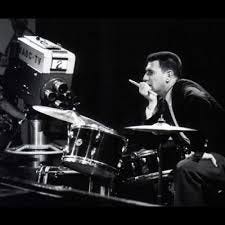West coast jazz drummer Shelley Manne.
Well, it had to happen. Trump’s extinction of the American arts finally got around to radio, and the Voice of America will soon be a thing of the past.
Not many Americans knew of the VOA. They weren’t meant too. Established in 1942, it used short-wave radio to broadcast propaganda, then expanded into music programs, justifying them as “cultural diplomacy”.
From hints in a few espionage novels, we can be pretty sure that a few apparently innocuous news reports contained information for the ears of agents deep under Soviet cover. It wasn’t only spooks who tuned in, however, though you might have thought so from our unhealthy indoor pallor and snarls to intrusive family members to “Shut the door!” For people growing up in small towns around the world, the VOA wasn’t simply a lifeline to the world but the world itself.
Australian radio replicated American. By day, a procession of domestic dramas marched through the living rooms of the nation, each sponsored by some deep-pocketed manufacturer of soap. The night was for game shows, with Sunday reserved for an Amateur Hour of the kind pioneered on NBC by Major Edward Bowes, the progenitor of America’s Got Talent. On weekends, we got sport, with blow-by-blow descriptions of cricket, football, tennis and, a particular penance, horse-races.
Pop music of the pre-rock era, mostly comic songs, polkas and lachrymose ballads (How Much Is That Doggy in the Window?), was ubiquitous, but almost nobody programmed jazz, particularly the modern variety. Fortunately, each week night, the VOA broadcast Music USA, two hours of jazz, the first half New Orleans and blues, the rest devoted to the moderns. My teenage years passed to the enigmatic noodling of Thelonious Monk, and an edgily precise Art Pepper, Chet Baker, Shelly Manne and Milton "Shorty" Rogers, embodiments of Californian cool.
Each track on Music USA was patiently annotated by presenter Willis Conover in his "Special” English, slowed to a crawl for the benefit of his core audience of middle European and Russian hipsters (and all right, a few spies). All over the world, we leaned close to our sets as the night’s program began with the crashing opening chords of Duke Ellington’s Take the A Train.
In Conover’s deliberate diction, names unfolded like Chinese paper flowers dropped in water. I suspect he chose certain tracks intentionally. How else to explain his relish in identifying Dizzy Gillespie's Night in Tunisia as "Night...in...Too...nees...ee..ahr" and lingering over the name of an obscure New Orleans bass player so that it emerged as "Al...cide...'Sloooow Drag' Pav...a... geaux."?
A lifetime of Chesterfields (an addiction that finally killed him) cured Conover's husky baritone to the suppleness of an old tobacco pouch. His nocturnal murmur, as distinctive as Lester Young's alto sax or Billie Holiday's voice, articulated like no other the sadness of that "dark night of the soul" where, as Scott Fitzgerald wrote, "it is always 3am." Augmented by Bill Evans playing My Funny Valentine or Peggy Lee singing Black Coffee ("Feeling mighty lonesome, haven't slept a wink..."), melancholy had no more lulling medicine.
Conover may have been little known in the US but he was a celebrity in eastern Europe, where to tune in to his program was an act of revolt. When he visited Poland, mobs greeted him at the airport. As he was driven through Warsaw in an open car, cheering crowds lined the streets. I hope some of my fellow admirers there are recalling him, and the VOA, tonight.





I knew of VOA growing up in America probably from watching old movies.
There are Willis Conover jazz hour clips on YouTube.
Trump also wants to rid us of NPR and PBS 😩
Such a beautiful tribute to something truly good and great and important…thank you!